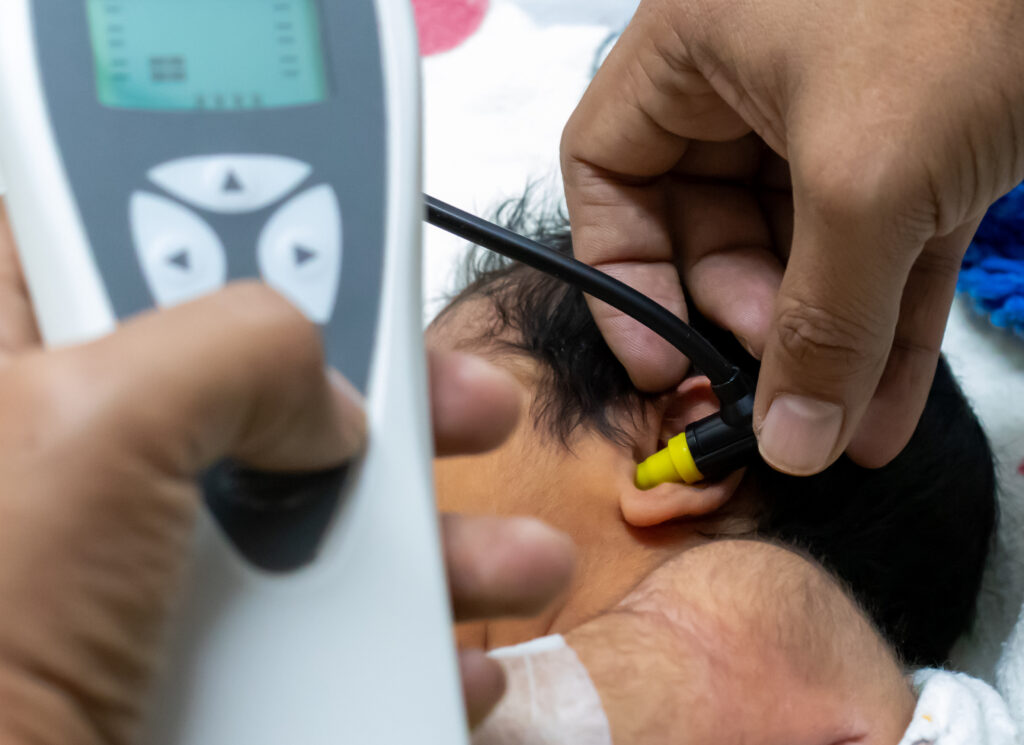The birth of a newborn is a transformative moment, inundating our lives with an abundance of wonder, hope, and love. It marks the beginning of a remarkable journey that is awe-inspiring and responsible. Among these responsibilities, none are as crucial as safeguarding the health and development of your child. This journey into parenthood is not just about cuddles and cooing; it is a profound commitment to nurture, protect, and ensure the well-being of your little one.
One of the most vital aspects of this journey is the newborn hearing screening, a procedure that might not initially stand out but is integral to your baby’s early development. In this blog, we embark on an exploration of the intricacies surrounding this essential examination. We will uncover what this hearing test entails, why it is a fundamental component of your baby’s health, and how it plays a pivotal role in the foundation of your child’s overall well-being.
What is Hearing Screening?
Newborn hearing screening is an objective test designed to assess your baby’s hearing soon after birth. It helps determine if your baby’s hearing is within the normal range or if further evaluation is necessary. Normal hearing is essential for a baby’s speech and language development.

Why is newborn Hearing Screening important?
Hearing loss is one of the most common birth disorders in newborns. Statistics show that approximately four to six babies out of every 1,000 born may have congenital or other forms of hearing loss.1 Screening and early diagnosis of hearing problems are crucial to promptly identifying auditory issues in infants.
Further, this early intervention can profoundly impact a child’s communication and language development. Unidentified hearing loss can lead to difficulties in behaviour, academic achievement, and language development without it.
When is the Hearing Screening test conducted?
Hearing screening for a newborn should ideally be performed after 12 hours of birth. If, for any reason, the screening is missed during the hospital stay, it must be conducted before your baby reaches one month of age or within six weeks. After this period, the calibration of the screening equipment may no longer be accurate.
How is Hearing screening done?
Two main methods to assess a newborn’s hearing are Otoacoustic Emissions (OAE) and Automated Auditory Brainstem Response (AABR). In AABR, electrodes are placed on specific areas of the baby’s head, and a soft ear tip is gently inserted into the baby’s ear. This ear tip emits a clicking sound, and the equipment records the baby’s hearing response, determining whether it is a pass or a refer. The process is quick, typically taking 15 to 20 minutes, and not painful for the baby. It is often conducted while the baby is asleep.
What if your newborn does not pass the hearing test?
If your newborn does not achieve a successful result in the hearing test, it is essential to understand that this does not automatically indicate a hearing impairment. Various factors, including the presence of ear fluid, ambient noise levels, or even your baby’s crying, can affect the screening outcomes. Nevertheless, a non-passing result should serve as a trigger for scheduling a follow-up diagnostic assessment before your baby reaches three months of age.
How is hearing loss treated in babies?
If your baby is diagnosed with hearing loss, various interventions are available, including hearing aids, cochlear implants, and other treatments. It is crucial to engage with your paediatrician if you notice that your child does not react to loud noises or seems unresponsive to sounds.
Newborn hearing screening is not just a medical test but a cornerstone in ensuring your baby’s bright and healthy future. Identifying and addressing potential hearing issues early on gives every child the best chance to embrace the world of sound, speech, and language. It is the gift of hearing, a gift that lasts a lifetime.
Newborn hearing screening might seem like a routine medical procedure, but it holds a profound significance. It is an early opportunity to assess and address potential hearing issues in your baby, ensuring they have access to the world of sound and communication right from the start. By diving into the details of this screening, we hope to illuminate its importance and empower you with the knowledge and understanding you need to make informed decisions about your child’s health and development.
[1]Roush, Jackson, et al. “Hearing Screening in North Carolina’s NICU and Well-Baby Nurseries: Impact of JCIH 2019 and COVID-19.” Journal of Early Hearing Detection and Intervention 7.1 (2022): 11-23.
